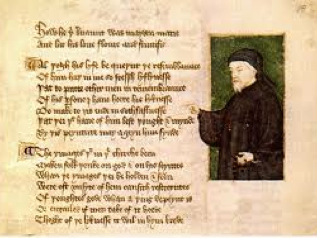
BLOG
The General Prologue of The Canterbury Tales
Thursday, September 8, 2011
Really, understanding the underlying meaning of the General Prologue is not too hard if you love sarcasm. Hearing the cool language is more of a challenge. So, I’ll give you a little primer on how to speak Middle English, sort of. Start with two basic tenets: 1) w’re going to try to make all the sounds the letters indicate, but ...2) we’re going to remember actual people actually talked this way, so we’re not going to get our tangs all tongueled.

The General Prologue
Whan that aprill with his shoures soote 1
The droghte of march hath perced to the roote, 2
And bathed every veyne in swich licour 3
Of which vertu engendred is the flour; 4
Whan zephirus eek with his sweete breeth 5
Inspired hath in every holt and heeth 6
Tendre croppes, and the yonge sonne 7
Hath in the ram his halve cours yronne, 8
And smale foweles maken melodye, 9
That slepen al the nyght with open ye 10
(so priketh hem nature in hir corages); 11
Thanne longen folk to goon on pilgrimages, 12
And palmeres for to seken straunge strondes, 13
To ferne halwes, kowthe in sondry londes; 14
And specially from every shires ende 15
Of engelond to caunterbury they wende, 16
The hooly blisful martir for to seke, 17
That hem hath holpen whan that they were seeke. 18
Bifil that in that seson on a day, 19
In southwerk at the tabard as I lay 20
Redy to wenden on my pilgrymage 21
To caunterbury with ful devout corage, 22
At nyght was come into that hostelrye 23
Wel nyne and twenty in a compaignye, 24
Of sondry folk, by aventure yfalle 25
In felaweshipe, and pilgrimes were they alle, 26
That toward caunterbury wolden ryde. 27
The chambres and the stables weren wyde, 28
And wel we weren esed atte beste. 29
And shortly, whan the sonne was to reste, 30
So hadde I spoken with hem everichon 31
That I was of hir felaweshipe anon, 32
And made forward erly for to ryse, 33
To take oure wey ther as I yow devyse. 34
There were no spelling books for English in the 1360’s, so Chaucer, and, in fact most writers until the 18th century, just spelled things the way they sounded, using the noises letters made in latin.
So, the long vowels are ahhh, ayyy, eee, ohh, oooh, and sometimes eee.
The short vowels... uh, eh, ih, ah, uh.
Inside a word, two vowels in a row are both pronounced, albeit quickly, so say “day’ as “Dah-ee” like an Australian might. This means that double vowels are like really long vowels. Also a “W” is actually a double “u” in sound.
End e’s are not silent! Just say “uh” , unless the next word begins with a vowel; then just slur the uh and the next sound together. (Listen to me say “...Droghte of...”)
Say all the consonants! No silent k’s!
Trill your r’s.
All the consonant blends are the same except the “gh” is never silent. Make a sound like your hocking up some phlegm.
A few words, like “engendred,” are pronounced as if they were French. This is a leftover from the Norman invasion. I only know that because of a great professor I once had... F. Xavier Barron.
Okay, now for a few notes.
“Zephyrus” is the west wind.
The ram in line 8 is Aries, the Zodiac sign.
“corages’ are hearts. Think of corazon in Spanish.
“Ferne” means sacred.
“kowthe” means known. So if your uncouth, you don’t know anything.
“strondes” are beaches (strands)
The martyr was Thomas a Becket, the Archbishop of Canterbury who was murdered in the cathedral for taking the side of the common folk against the king.
I guess the Tabard was a real inn.
The great thing about the “sondry folk” of this pilgrimage is that religion was a common ground, so Chaucer could have upper class people, like the Knight and The Franklin, hang around with clergy, like the Monk and the Prioress, middle class people like the Wife of Bath, tradesmen like the Miller, and even a few lower class people like the Plowman.
He created a microcosm of English society. Then, of course, he mocked the heck out of everyone, especially corrupt Church officials.
If one went on one of these pilgrimages, one was usually hoping to earn an indulgence, a “get out of jail free” certificate to be redeemed in Purgatory! Martin Luther hated the practice of selling stairways to heaven, but Chaucer, by frankly exposing the Church’s corruption, predated him by more than 100
